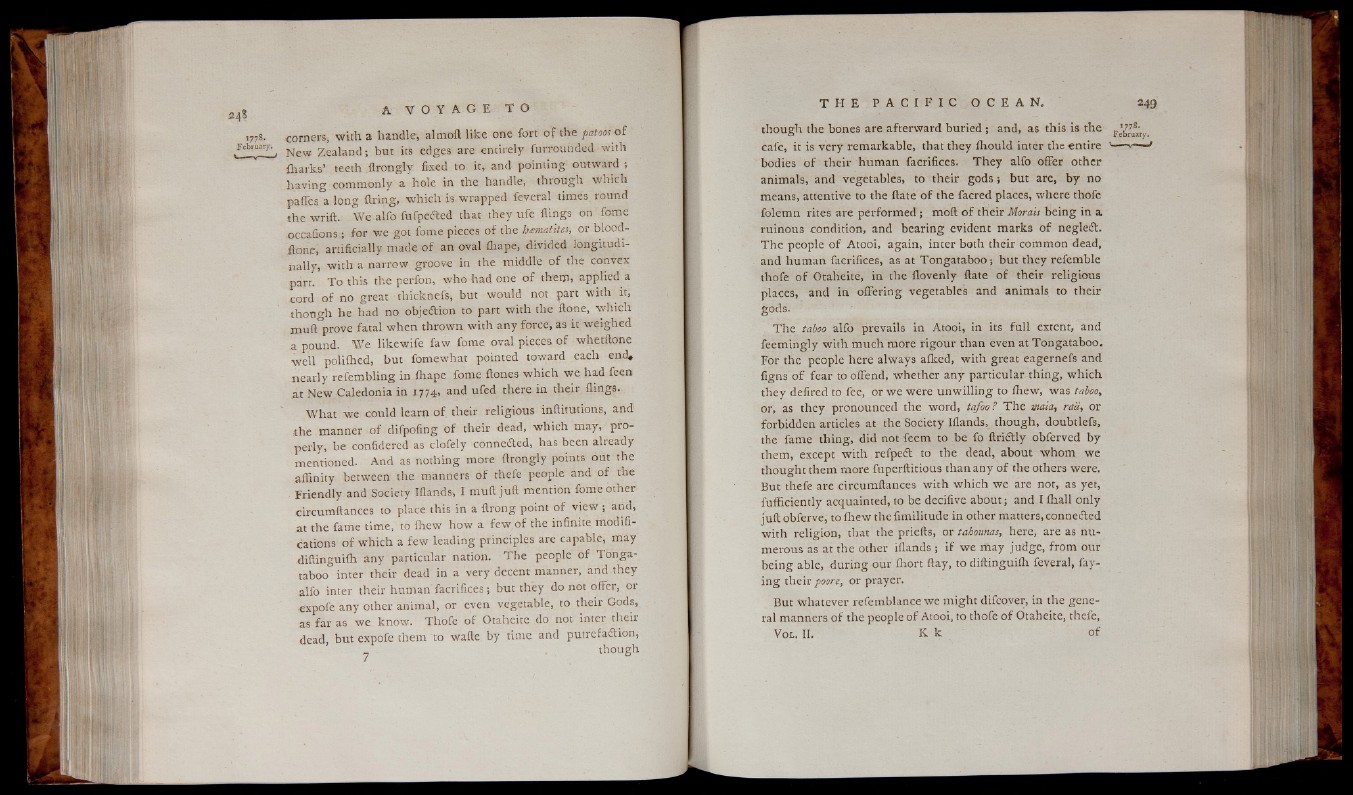
corners, w ith a handle, almoft lik e one fort o f the patoos o f
New Zealand; but its edges are entirely furrounded with
{harks’ teeth ftrongly fixed to it, and pointing outward ;
h a v in g commonly a hole in the handle, through w hich
paffes a long firing, w hich is wrapped feveral times round
the wrift. We alfo fufpeftcd that they ufe flings on fome
occaiions ; for we got fome pieces o f the hematites, or blood-
ilone, artificially made o f an oval fhape, divided longitudinally
, w ith a narrow groove in the middle o f the convex
part. T o this the perfon, who had one o f them, applied a
cord o f no great thicknefs, but would not part with it,
though he had no objection to part with the ftone, w hich
rnuft prove fatal when thrown w ith any force, as it weighed
.a pound. We lik ew ife faw fome oval pieces o f whetftone
w e ll polifhed, bu t fomewhat pointed toward each end,
nearly refembling in fhape fome flones w h ich we had feen
at New Caledonia in 1774. and ufed there in their flings.
What we could learn o f their religious inftitutions, and
the manner o f difpofing o f their dead, w hich may, properly,
be confidered as clofely conneaed, has been already
mentioned. And as nothing more ftrongly points out the
affinity between the manners o f thefe people and o f the
Friendly and Society Iflands, I m u ftju ft mention fome other
circumftances to place this in a ftrong point o f view ; and,
at the fame time, to ihew how a few, o f the infinite modifications
o f w hich a few leading principles are capable, may
diftinguifh any particular nation. T h e people o f Tonga-
taboo inter their dead in a very decent manner, and they
alfo inter their human facrifices; but they do not offer, 01-
expofe any other animal, or even vegetable, to their Gods,
as fa r as we know. Thofe o f Otaheite do not inter their
dead, but expofe them to wafte by time and putrefaction,
7 . though
though the bones are afterward buried ; and, as this is the Fe^r7®a‘ry
cafe, it is ve ry remarkable, that they fhould inter the entire — *—
bodies o f their human facrifices. T h e y alfo offer other
animals, and vegetables, to their g o d s ; but are, b y no
means, attentive to the ftate o f the facred places, where thofe
folemn rites are perfo rmed; | moft o f their Morais b e in g in a
ruinous condition, and bearing evident marks o f n eg le ih
T h e people o f Atooi, again, inter both their common dead,
and human facrifices, as at T ong ataboo ; but they refemble
thofe o f Otalieite, in the ilovenly ftate o f their religious
places, and in offering vegetables and animals to their
gods.
T h e taboo alfo prevails in Atooi, in its fu ll extent, and
feeming ly with much more rigour than even at Tongataboo.
For the people here always aiked, w ith great eagernefs and
figns o f fear to offend, whether any particular thing, which
they defired to fee, or we were u nw illin g to ihew, was taboo,
or, as they pronounced the word, tafoo? T he mala, raii, or
forbidden articles at the Society Iflands, though, doubtlefs,
the fame thing, did not feem to be fo ftrictly obferved b y
them, except w ith refpedf to the dead, about whom we
thought them more fuperftitious than any o f the others were.
But thefe are circumftances w ith w hich w e are not, as yet,
fufficiently acquainted, to be decifive a b ou t; and I ihall only
juft obferve, to ihew the fimilitude in other matters, connected
w ith religion, that the priefts, or tahounas, here, are as n u merous
as at the other iflands ; i f we may judg e, from our
being able, during our ihort ftay, to diftinguiih feveral, fayin
g their poore, or prayer.
But Whatever refemblance we might difcover, in the general
manners o f the people o f Atooi, to thofe o f Otaheite, thefe,
V o l . II. K k o f